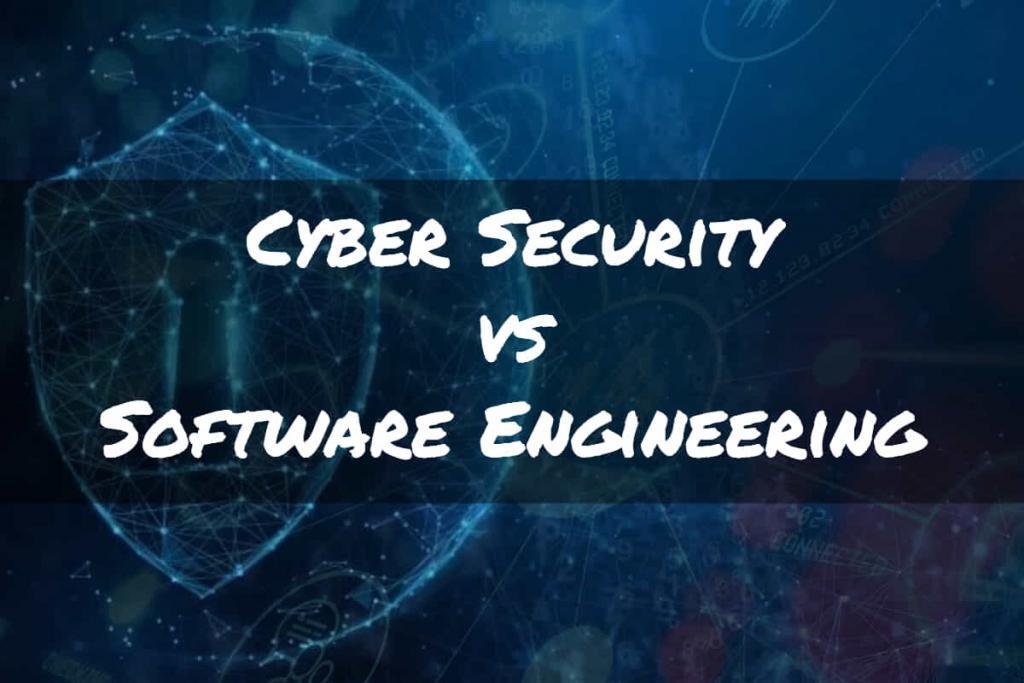Trying to decide which career path to take? The truth is, there are some similarities between cyber security vs computer science but also some key differences. In today’s article, we’ll discuss both to help you make the right choice.
Table of Contents
Interested in learning more about cyber security vs computer science. Click below to find out!
Is Computer Science the Same as Cyber Security?
What’s The Difference Between Cyber Security and Computer Science?
Is Computer Science Needed for Cyber Security?
Can You Do Cyber Security with A Computer Science Degree?
Can I Do Master’s in Cyber Security After a Bachelor’s in Computer Science?
Which Degree Is Better Computer Science or Cyber Security?
Is Computer Science the Same as Cyber Security?
Is cyber security computer science or does cyber security fall under compute science? The answer is… it depends.
It’s true that some of the concepts behind cyber security are shared with computer science, like coding and programming.
But at its core, cyber security is about protecting data—and there’s a lot more to protecting data than just being able to code; there’s a certain psychology involved in cyber security.
For example, if you’re trying to protect a computer from getting hacked, you need to know the various ways hackers might attempt to breach a system. One such method, which often has nothing to do with computer science, is social engineering (think email or phishing scams).
Physical security, such as locking an office which may contain sensitive information, is also another example where computer science has no bearing.
Security concepts such as access control may require coding to grant a user access to a specific system but is also as simple as determining who is allowed to have access which doesn’t require coding.
What’s The Difference Between Cyber Security and Computer Science?
What is Cyber Security?
Cyber security is a multi-faceted and rapidly growing field that involves protecting information systems to ensure the confidentiality, integrity, and the availability of such information (commonly known as the “CIA Triad”) through various means.
There are many different types of jobs in this field, but all of them deal with protecting against threats, either internal or external.
As a cyber security professional, you would usually find yourself working as part of a larger team, and your job could be anything from securing a specific system to managing the security of the entire corporate infrastructure.
And What Can You Do with A Cyber Security Degree?
With a cyber security degree you’re open to nearly any job in cyber security. Here’s a list of the 11 cyber security domains in which you can excel:
- Security Frameworks and Standards
- Application Security
- Security Risk Assessment
- Enterprise Risk Management
- Security Governance
- Threat Intelligence
- Security Training
- Security Operations
- Physical Security
- Career Development
- Security Architecture
Want to know if a cyber security degree is worth it?
What is Computer Science?
Britannica defines the field of computer science as, “the study of computers and computing, including their theoretical and algorithmic foundations, hardware and software, and their uses for processing information. The discipline of computer science includes the study of algorithms and data structures, computer and network design, modeling data and information processes, and artificial intelligence”.
It’s a popular technology field that utilizes Python, Java, and multitude of other computer languages used to program information systems.
And What Can You Do with A Computer Science Degree?
With a computer science degree you can have your choice of jobs in over 100 different careers.
Read below to help you discover exactly how to start your cyber security career with a computer science degree.
Is Computer Science Needed for Cyber Security?
“Do I need a computer science degree for cyber security?”…”maybe!”
Cyber security is a multidisciplinary field that requires skills from many different disciplines, including computer science, but the answer to whether you need a computer science degree depends on what kind of job you want in this field.
There are plenty of jobs available in the industry for non-programmers!
But when people ask this question, they’re really trying to figure out if they should get an undergraduate degree in computer science, software engineering, or some other IT degree.
And most of the time, the answer is “it doesn’t matter.”
Even if you decide not to pursue a computer science degree, you’ll still need to know how computers work, the basics of computer programming, how they communicate with each other, and how they store and process information.
Is Cyber Security Easier Than Computer Science?
Or is…“Is cyber security harder than computer science?” No, cyber security is not any easier or harder than computer science. Although some overlap exists between these fields, the two are quite different and require different skill sets.
Can You Do Cyber Security with A Computer Science Degree?
Is computer science a good degree for cyber security? Yes, you can do cyber security with a computer science degree. Read each step below to get you on the right path…
There’s No Perfect Degree
The first thing you should know is that there is no single, specific degree or certification that will teach you how to do cyber security. You’ll need to start by working towards an undergraduate degree in computer science. This will give you the foundation for understanding how computers work, how they’re vulnerable, and how you can protect them from threats.
Take a Few Security Courses
You’ll want to consider taking a few courses in security or information assurance. Get the best use of your credits by taking electives in any of the security courses available to you. Even if you exceed the number of credits required to graduate by a little bit, that’s okay. With enough credits, you may even qualify for a minor in cyber security. With this, you’ll be more likely prepared for careers in digital forensics, incident response management, cybercrime investigation and prevention, cryptography, network security administration, etc.
Start Attending Cyber Security Conferences
Infosec-Conferences.com has an amazing user-submitted list of nearly every security conference available. You will have to do some research to determine if student discounts are available; however, you can also find low cost or free opportunities with your local technology council, university cyber club, BSides, Eventbrite, or Meetup.
Get Experience Quickly!
Earning a computer science degree is important and will help you get your foot in the door, but it won’t get you far on its own.
The reality is that most companies are looking for people who have both technical skills and real-world experience. This means you need to take every opportunity to gain experience whether that’s through an internship, volunteering your IT knowledge, solving people’s personal computer issues…anything! The one advantage you have with a comp sci degree is that it’ll be much easier for you to land a job versus an infosec degree.
Marketing is Everything!
How do you expect to land a job if no one knows you exist? In the end, you’ll need to network with people. Post your resume on websites…such as MyTurn (coming soon) and get a LinkedIn profile going. But having a profile isn’t enough, you need to cut through the clutter just to be seen. Start writing meaningful LinkedIn articles, participating in security discussion in your local security conferences or groups, have a GitHub profile started! Do everything you can just to be seen!
Seek Out Security Certifications
Once you’ve got your undergraduate degree, then it’s time for some hands-on training through certifications. There are two good certifications available for starting out, including: CompTIA Security+ or ISC2 “Certified In Cybersecurity”. Pick one start out with. You’ll need to get a few different certifications and maybe attend some security bootcamps, but all these things can be done with a computer science degree.
To recap, can you work in cyber security with a computer science degree? Yes, you can! But it’s not as easy as you may think. As long as you’re willing to put in some hard work and dedication, there’s no reason why you shouldn’t be able to find employment!
Can I Do Master’s in Cyber Security After a Bachelor’s in Computer Science?
Absolutely! To pursue a master’s degree in cyber security, it’s worth looking into these two pathways…
Online Program: One of the most common options is an online program. These programs typically take one to two years to complete and can be completed on your own schedule. Online programs are great because they allow students to continue working while they study. That way you don’t have to worry about missing out on opportunities because of your education.
Campus-based Program: Another option is a campus-based program—these courses are taught by professors who work at local colleges or universities, so you’ll be able to see them in person whenever necessary. Campus-based programs are often more expensive than online programs because they include other fees associated with attending school on campus (meals, housing costs). However, they also offer academic support services like counseling and tutoring services that might not be available through online schools.
How long it takes to complete a cybersecurity degree?
Which Degree Is Better Computer Science or Cyber Security?
Cyber security vs computer science, which is better?…Neither. The core difference is how technical you want to get when it comes to security.
More Technical: If you’re interested in the technical side of things, then computer science would probably be more appropriate for you. With a computer science degree, you’ll have the foundational knowledge to understand security from a coding perspective. You’ll learn about different programming languages, coding techniques, and integration methods while developing software and applications for securing information systems.
Additionally, with a computer science degree, you have a certain amount of flexibility that you’re not going to get with a cyber security degree, making it easier to enter the infosec industry. The same can’t be said for a cyber security degree; you can’t suddenly become a python developer with a cyber degree.
A computer science degree is good if you’re looking to get into Application Security, Security Operations, and Security Architecture.
Less Technical: On the other hand, if you’re leaning towards the less technical side, getting a cyber security degree is probably a better option. With this degree, you’ll learn about the various types of network infrastructures and their security vulnerabilities, offensive and defensive security measures, security risks, policies and procedures, social engineering techniques, as well as encryption methods (like public key cryptography).
A cyber security degree is perfect if your area of interest is Security Frameworks and Standards, Security Risk Assessment, Enterprise Risk Management, Governance, Security Training, Physical Security, Threat Intelligence, or Career Development.
Still Having Trouble Deciding Which Is Better Computer Science or Cyber Security?
Still having difficulty in making a choice between cyber security vs computer science, then let me help you out. If you’re more technically inclined, go with the computer science. For the less tech savvy, not that there aren’t some technical aspects to the degree, then go for the cyber security degree.
With a cyber security degree, you’re saying to yourself that security is the career path I want to take. With a computer science degree, you’re provided a wide variety of fields from which to choose.
Ultimately, the final decision is yours. But it’s probably a lot easier to move from a more technical degree to a less technical degree. If you’re ambitious enough, you can do both!
Interested in More…
What Is the Best Job in Cyber Security?
The Best Method to Become a Security Auditor!
Wondering How to Be a SOC Analyst?
Choose the Right Career, Cyber Security vs Ethical Hacking




Hello There. I discovered your blog using msn. That is an extremely well
written article. I’ll make sure to bookmark it and
come back to learn extra of your useful info. Thanks for the post.
I’ll definitely return.
Thanks Savannah, I’ll do my best to provide you with more!